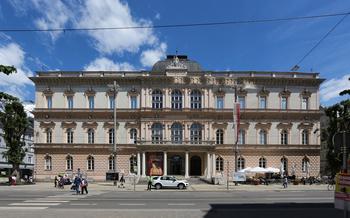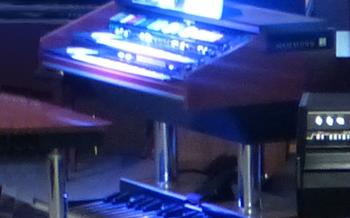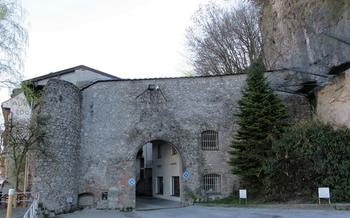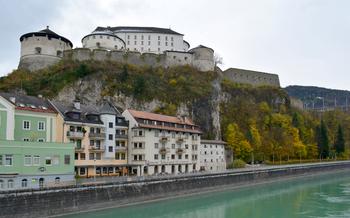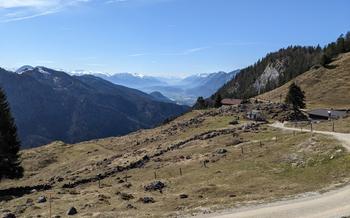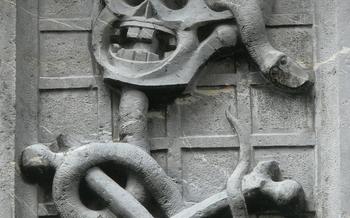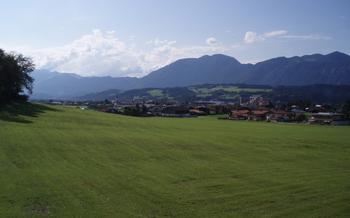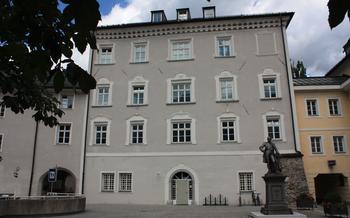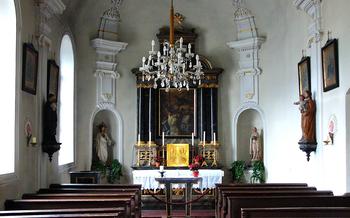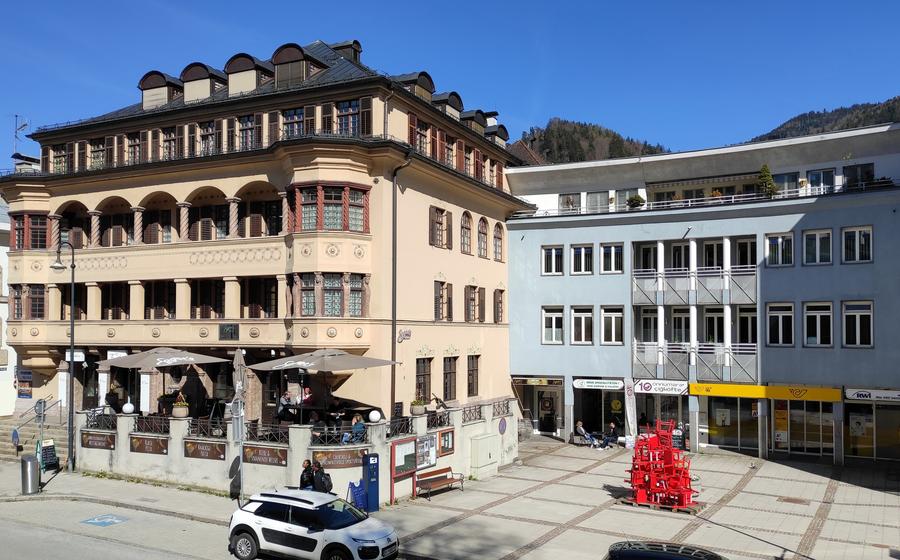
The Tyrolean Bee Museum
- History of the Tyrolean Bee Museum
- Location and Accessibility:
- Museum Exhibits and Displays
- Beekeeping Practices and Honey Production
- Interactive Workshops and Demonstrations
- Honey Tasting and Local Products:
- Educational Programs and School Visits
- Bee-Friendly Garden and Apiary
- Events and Festivals
- Research and Conservation Efforts
- Museum Shop and Souvenirs
- Accessibility for Families with Children
- Photography and Social Media
- Sustainable Tourism and Eco-Friendly Practices
- Insider Tip:
History of the Tyrolean Bee Museum
In the heart of the picturesque town of Kufstein, nestled amidst the stunning Tyrolean Alps, lies a hidden gem dedicated to the fascinating world of bees – the Tyrolean Bee Museum. Its story begins in the late 19th century when beekeeping, a vital part of Tyrolean culture and economy, faced significant challenges. Recognising the need to preserve and promote this ancient craft, a group of passionate beekeepers founded the Tyrolean Beekeeping Association in 187
Driven by their dedication to bees and beekeeping, the association members established the Tyrolean Bee Museum in 192Initially housed in a modest room, the museum showcased a collection of beekeeping tools, honey production equipment, and bee-related artifacts. Over the years, the museum's popularity grew, and in 1953, it moved to its current location, a beautifully renovated historic building in the center of Kufstein. Today, the Tyrolean Bee Museum stands as a testament to the rich beekeeping heritage of Tyrol, attracting visitors from around the world with its captivating exhibits and educational programs.
Location and Accessibility:
The Tyrolean Bee Museum is conveniently located in the historic town of Kufstein, nestled amidst the stunning Alpine landscapes of Tyrol, Austria. To reach the museum, visitors can take a leisurely stroll from the picturesque Old Town, following the signs that lead to the museum's entrance. The museum is also easily accessible by public transportation, with bus stops and train stations within walking distance. For those arriving by car, ample parking is available nearby.
For visitors with disabilities, the museum is fully accessible, with wheelchair ramps, elevators, and designated parking spaces. The museum staff is also dedicated to providing assistance and ensuring a comfortable visit for all guests.
Museum Exhibits and Displays
The Tyrolean Bee Museum boasts an array of captivating exhibitions that immerse visitors in the fascinating world of bees. The permanent exhibition, "Bees - Life and Work," takes center stage, providing an in-depth exploration of bee biology, behavior, and their crucial role in the ecosystem. Interactive displays and educational panels engage visitors of all ages, allowing them to delve into the intricate world of these buzzing creatures.
Among the highlights of the collection are the diverse beekeeping tools and equipment used throughout history. Visitors can marvel at the evolution of beekeeping practices, from traditional straw hives to modern, high-tech equipment. The museum also showcases a vast array of bee-related artifacts, including vintage honey extractors, wax-making machines, and intricate beehive decorations. These artifacts offer a glimpse into the rich cultural heritage of beekeeping in Tyrol.
Beekeeping Practices and Honey Production
In the Tyrolean Bee Museum, visitors can explore the traditional and modern beekeeping practices that have shaped Tyrolean culture and economy for centuries. Traditional beekeeping methods, such as using wooden beehives and natural materials, are showcased alongside modern techniques that employ innovative equipment and scientific approaches. The museum provides a comprehensive overview of the beekeeping process, from the care and maintenance of bee colonies to the extraction and processing of honey.
Interactive displays and demonstrations allow visitors to witness the fascinating world of bees up close. Observe skilled beekeepers as they tend to their hives, carefully inspecting the bees and ensuring their well-being. Learn about the intricate communication system within the hive, the roles of different bees, and the importance of maintaining a healthy bee population.
The museum also sheds light on the honey production process, from the collection of nectar by foraging bees to the extraction and processing of honey. Discover the different types of honey produced in Tyrol, each with its unique flavor and characteristics, influenced by the region's diverse flora and climate. Local beekeepers are often invited to share their knowledge and experiences, providing visitors with insights into the challenges and rewards of beekeeping in Tyrol.
Interactive Workshops and Demonstrations
The Tyrolean Bee Museum offers a range of interactive workshops and demonstrations that provide visitors with hands-on experiences and a deeper understanding of beekeeping and honey production. These workshops are led by experienced beekeepers who share their knowledge and expertise with participants.
Guided Tours:
Guided tours of the museum are available for groups and individuals, offering a personalized and informative experience. Visitors can learn about the history of beekeeping in Tyrol, the different types of bees, and the process of honey production. The tours also include a visit to the museum's apiary, where visitors can observe live bees in their natural habitat.
Workshops:
The museum conducts workshops on various aspects of beekeeping, such as beehive construction, honey extraction, and queen bee rearing. These workshops are suitable for both beginners and experienced beekeepers who want to learn more about the craft. Participants can gain practical skills and knowledge that they can apply in their own beekeeping practices.
Demonstrations:
Throughout the year, the museum hosts demonstrations showcasing different beekeeping techniques and practices. Visitors can witness live beehive inspections, honey harvesting, and other activities that provide a glimpse into the daily life of a beekeeper. These demonstrations offer a unique opportunity to learn about the intricate world of bees and the importance of their role in our ecosystem.
Whether you are a seasoned beekeeper or simply curious about the world of bees, the Tyrolean Bee Museum's interactive workshops and demonstrations provide an immersive and educational experience that will leave you with a newfound appreciation for these remarkable creatures.
Honey Tasting and Local Products:
At the Tyrolean Bee Museum, visitors have the opportunity to sample different types of honey produced in Tyrol. The region is renowned for its diverse honey varieties, each with unique flavors and characteristics. Visitors can indulge in tastings of acacia honey, characterized by its delicate floral notes, chestnut honey, known for its rich and earthy flavor, and wildflower honey, a harmonious blend of various blossoms.
The museum's knowledgeable staff provides insights into the distinct flavors and origins of each honey, explaining the influence of local flora and beekeeping practices. Visitors can learn about the importance of bees in the pollination process and their role in preserving the region's biodiversity.
In addition to honey tasting, the museum offers a selection of local bee-related products for purchase. Visitors can take home beeswax candles, which emit a natural and pleasant aroma, propolis, a resinous substance produced by bees with reputed health benefits, and honey-based cosmetics, such as soaps, creams, and lip balms.
By purchasing these local products, visitors not only support the museum's educational mission but also contribute to the preservation of traditional beekeeping practices and the sustainability of the region's beekeeping industry.
Educational Programs and School Visits
The Tyrolean Bee Museum recognizes the importance of educating future generations about bees and beekeeping. It offers a range of educational programs tailored to different age groups and school levels. These programs provide students with hands-on experiences, interactive workshops, and educational materials to enhance their understanding of the world of bees.
Schools and groups can book guided tours of the museum, where students can learn about the history of beekeeping, the role of bees in the ecosystem, and the process of honey production. Guided tours are led by experienced beekeepers who share their knowledge and passion for bees with the young visitors.
The museum also offers workshops and demonstrations that allow students to get up close and personal with live bees. They can observe the behavior of bees, witness the process of honey extraction, and even handle beekeeping equipment under the supervision of experts. These interactive experiences help students develop a deeper appreciation for bees and their vital role in our environment.
Resources and materials are available for teachers and students to use in the classroom before and after their visit to the museum. These resources include lesson plans, worksheets, and interactive activities that help reinforce the concepts learned at the museum.
Field trips and outdoor activities related to beekeeping are also organized by the museum. Students can visit local beekeepers, observe beehives in action, and learn about the challenges and rewards of beekeeping. These field trips provide a unique opportunity for students to gain practical experience and develop a hands-on understanding of beekeeping.
Bee-Friendly Garden and Apiary
The Tyrolean Bee Museum boasts a beautiful bee-friendly garden and apiary, offering visitors a unique opportunity to learn about the importance of pollinators and the museum's efforts to promote biodiversity. The garden is a haven for bees and other beneficial insects, featuring a variety of nectar-rich plants and flowers. Visitors can stroll through the garden, admire the vibrant blooms, and observe the bees as they flit from flower to flower, collecting pollen and nectar.
The apiary, located within the garden, houses several beehives, where visitors can witness the fascinating world of bees up close. Beekeepers are often on hand to provide insights into the life cycle of bees, their social structure, and the vital role they play in our ecosystem. Visitors can learn about the importance of bees for pollination and the challenges they face, such as habitat loss and climate change.
The museum's bee-friendly garden and apiary serve as a valuable educational resource, demonstrating the importance of protecting bees and promoting sustainable beekeeping practices. Visitors of all ages can gain a deeper understanding of the fascinating world of bees and their significance for our planet's biodiversity.
Events and Festivals
The Tyrolean Bee Museum hosts a variety of beekeeping-related events and festivals throughout the year. These events provide an opportunity for visitors to immerse themselves in Tyrolean beekeeping culture and experience the region's beekeeping traditions firsthand.
One of the highlights is the annual Tyrolean Honey Festival, held in August. This festival celebrates the Tyrolean beekeeping tradition and features a range of activities, including honey tasting, beekeeping demonstrations, and workshops on beekeeping techniques. Visitors can also sample and purchase a variety of local honey products, including honey-based foods, drinks, and cosmetics.
Another popular event is the International Beekeeping Symposium, held every two years. This symposium brings together beekeepers, researchers, and experts from around the world to share knowledge and discuss the latest developments in beekeeping. Visitors can attend lectures, workshops, and demonstrations, and network with beekeepers from different countries.
These events offer a unique opportunity to learn about Tyrolean beekeeping culture, sample local honey products, and connect with beekeepers and enthusiasts from around the world. Visitors are encouraged to check the museum's website for dates and more information on upcoming events.
Research and Conservation Efforts
The Tyrolean Bee Museum is actively involved in research and conservation initiatives aimed at protecting bees and promoting sustainable beekeeping practices. The museum collaborates with beekeepers, universities, and organizations to conduct research on bee health, bee behavior, and the impact of climate change on bee populations. Through these collaborations, the museum contributes to the development of innovative beekeeping techniques and the preservation of local bee breeds.
Additionally, the museum works to raise awareness about the importance of bees and the threats they face. Educational programs, workshops, and outreach events are organized to inform the public about the vital role of bees in the ecosystem and the need to protect them. By promoting sustainable beekeeping practices and educating the public, the museum plays a crucial role in ensuring the survival of bees and the preservation of their valuable contributions to our environment.
Museum Shop and Souvenirs
The Tyrolean Bee Museum offers a well-stocked museum shop where you can purchase unique souvenirs and gifts inspired by bees, honey, and beekeeping. From honey-based cosmetics and beeswax candles to bee-themed jewelry and home décor, there's something for everyone.
The museum shop also features a selection of books and educational materials on bees and beekeeping, making it a great place to learn more about these fascinating creatures. By purchasing souvenirs from the museum shop, you not only take home a piece of Tyrolean beekeeping culture but also support the museum's educational mission and its efforts to promote sustainable beekeeping practices.
Accessibility for Families with Children
The Tyrolean Bee Museum offers a range of facilities and programs designed to cater to families with young children. The museum's interactive exhibits are engaging and educational for children of all ages, providing hands-on experiences that allow them to learn about bees and beekeeping in a fun and interactive way. Educational resources such as books, games, and puzzles are available to help children understand the importance of bees and their role in the environment. The museum also organizes regular events and workshops speziell for children, including storytelling sessions, craft activities, and guided tours tailored to their interests. These events provide a unique opportunity for children to learn about bees and beekeeping while having fun and making new friends. The museum's staff is always on hand to assist families with children, ensuring that their visit is enjoyable and educational.
Photography and Social Media
The Tyrolean Bee Museum encourages visitors to capture their experiences through photography and share them on social media. The museum's picturesque setting, interactive exhibits, and fascinating bees provide ample opportunities for stunning photographs. Visitors are welcome to take photos and videos for personal use, but they are kindly requested to respect the privacy of other guests and museum staff.
The museum's social media channels, including Facebook, Instagram, and Twitter, provide a platform for visitors to share their experiences, ask questions, and connect with other bee enthusiasts. By using hashtags such as #TyroleanBeeMuseum, #BeesOfTyrol, and #BeekeepingInAustria, visitors can contribute to the online community and raise awareness about the importance of bees and beekeeping.
The museum's social media presence also serves as a valuable resource for visitors to stay updated on upcoming events, workshops, and exhibitions. Visitors are encouraged to follow the museum's social media channels to stay connected and learn more about the fascinating world of bees.
Sustainable Tourism and Eco-Friendly Practices
The Tyrolean Bee Museum is committed to sustainable tourism and eco-friendly practices. The museum has implemented various measures to reduce waste, conserve resources, and protect the environment. Visitors are encouraged to adopt sustainable practices during their visit by using reusable water bottles, avoiding single-use plastics, and respecting the museum's natural surroundings. The museum also supports local businesses and suppliers that share its commitment to sustainability.
One of the museum's most notable eco-friendly initiatives is its bee-friendly garden. The garden is planted with a variety of bee-friendly flowers and plants, which provide bees with nectar and pollen. The museum also maintains an apiary, where bees are kept in hives and cared for by experienced beekeepers. The honey produced by the bees is used in the museum's honey tasting sessions and is also sold in the museum shop.
By adopting sustainable practices and promoting bee-friendly initiatives, the Tyrolean Bee Museum is not only educating visitors about the importance of bees and beekeeping but also actively contributing to the protection of the environment and the promotion of sustainable tourism in the region.
Insider Tip:
For a truly unforgettable experience, visit the museum during the annual "Honigfest" or Honey Festival. Held every August, this lively celebration brings together beekeepers, honey producers, and enthusiasts from across the region. Indulge in honey tastings, witness beekeeping demonstrations, and soak up the vibrant atmosphere as you learn about the fascinating world of bees and their vital role in our ecosystem. It's a great opportunity to connect with local experts, sample delicious honey-based treats, and take home unique souvenirs to cherish. Remember to check the museum's website for dates and details, and be sure to arrive early to avoid the crowds.
